 Petzlover
Petzlover Pantherette is originated from United States but Traditional Siamese is originated from Thailand. Both Pantherette and Traditional Siamese are having almost same weight. Pantherette may live 5 years less than Traditional Siamese. Both Pantherette and Traditional Siamese has same litter size. Pantherette requires Low Maintenance. But Traditional Siamese requires Moderate Maintenance
Pantherette is originated from United States but Traditional Siamese is originated from Thailand. Both Pantherette and Traditional Siamese are having almost same weight. Pantherette may live 5 years less than Traditional Siamese. Both Pantherette and Traditional Siamese has same litter size. Pantherette requires Low Maintenance. But Traditional Siamese requires Moderate Maintenance
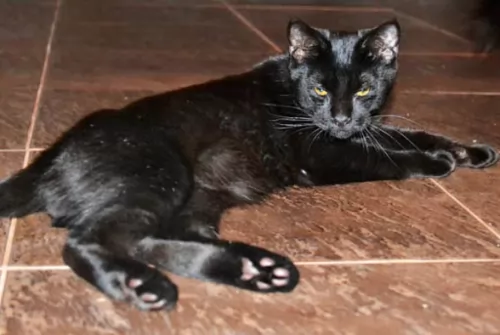 There isn’t too much history to the beautiful black Panetherette cat as it is still in development. It is in other words a hybrid cat and the name ‘Pantherette’ was give to the cat to describe its magnificent looks.
There isn’t too much history to the beautiful black Panetherette cat as it is still in development. It is in other words a hybrid cat and the name ‘Pantherette’ was give to the cat to describe its magnificent looks.
It looks just like the wild Black Panther or Black Leopard. There is, however, certainly no wild black panther or leopard that has been used
The Pantherette is a hybrid breed of cat that is still under development. It is intended to look similar to a Black Panther. It is a new breed based on a Melanistic (Black) Bengals as one of the foundation breeds.
The Pantherette is registered with the International Progressive Cat Breeders Alliance (IPCBA).
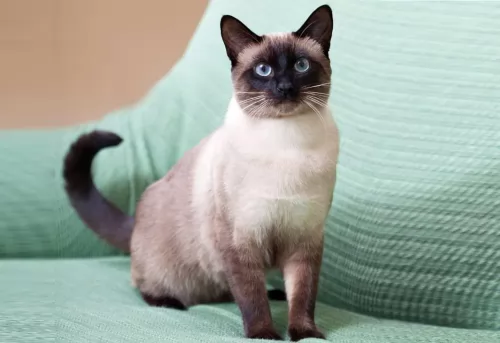 There are now three types of Siamese cats. The Traditional Siamese is said to be the original cat imported from Thailand.
There are now three types of Siamese cats. The Traditional Siamese is said to be the original cat imported from Thailand.
The Classic was the type that was common in the 50’s, 60’s and 70’s. The original Siamese cat became one of the most popular breeds in Europe and North America in the 19th century.
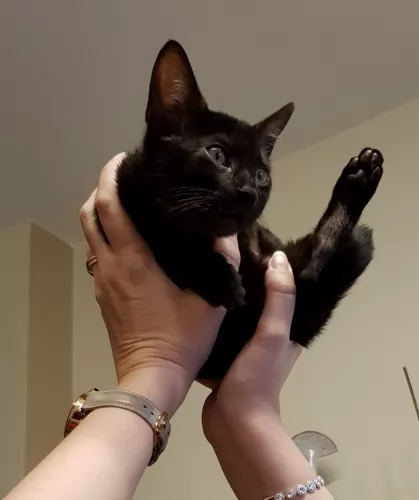 The Panehterette is a medium to large black cat still being developed, It weights in the area of 4 – 9kg. It is muscular and strong with a long body and a broadish head.
The Panehterette is a medium to large black cat still being developed, It weights in the area of 4 – 9kg. It is muscular and strong with a long body and a broadish head.
The legs at the back are slightly longer than the front. The legs are strong and muscular and medium in length with large, round paws. The tail of the Panethereet is medium to long in length, thick and slightly tapered.
The beautiful coat is short to medium in length and luxurious and silky. The ears are small to medium with rounded tips. The eyes are oval and set wide apart. They can be gold-colored or green.
The Pantherette breed is still in the beginning stages of its development, so there isn’t too much information on its temperament. Those who work with these cats say that they have the typical temperament of a domesticated cat and that they are alert, friendly, curious and that they enjoy being in the company of their human companions.
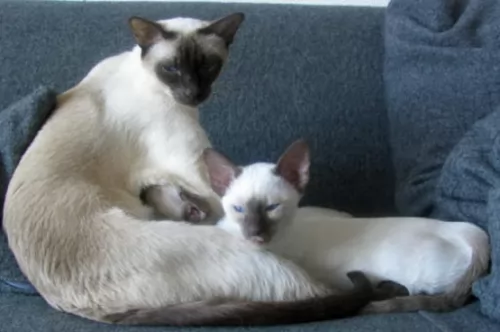 The Traditional Siamese cat is medium-sized, lean, and muscular and weighs between 3 and 6kg. The coat is short and he is considered a medium shedder.
The Traditional Siamese cat is medium-sized, lean, and muscular and weighs between 3 and 6kg. The coat is short and he is considered a medium shedder.
The kittens of these cats are born white and the coloring comes in over the next days and weeks. The head of the Traditional Siamese is well proportioned to its body size.
The medium size ears are slightly rounded at the tip and the eyes are large and bright blue in color.
The coat is short, sleek, and soft and accepted colors are cream with chocolate, brown, lilac, red, tortie or blue points.
The personality of the Traditional Siamese is loud, vocal, and demanding. These cats let you know precisely what they want and it is almost like having a human companion in the house.
They love to give their human owners lots of attention as well. They’re intelligent, curious, playful, and energetic.
The Traditional Siamese cat isn’t really recognized by the Cat Fanciers Association (CFA) anymore as the breed’s temperament has changed so much.
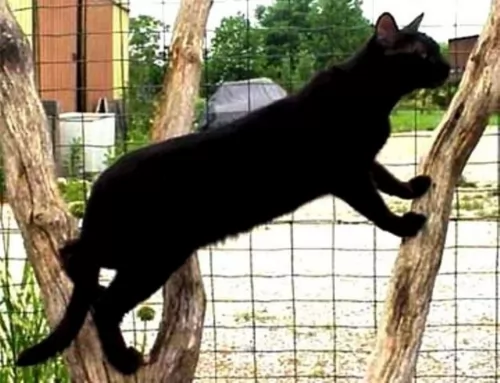 Domestic hybrid cats such as the Pantherette make great pets. However, you need to bear in mind that these cats have that wild side to them and they often try to escape.
Domestic hybrid cats such as the Pantherette make great pets. However, you need to bear in mind that these cats have that wild side to them and they often try to escape.
They are larger than the regular cat and its always advisable to have an outdoor shelter for them as well. The Pantherette is a truly beautiful cat but read up all you can on hybrid cats before you bring one into your home.
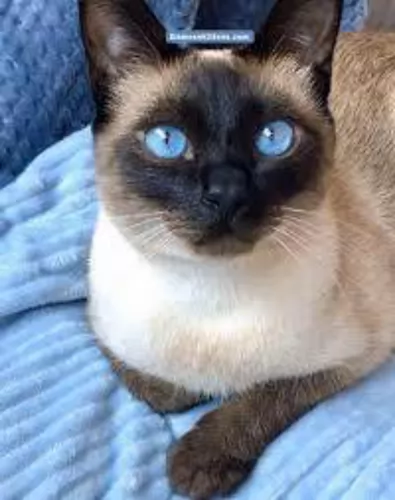 The Traditional Siamese cat is such an amazingly intelligent animal and sometimes they can become quite human.
The Traditional Siamese cat is such an amazingly intelligent animal and sometimes they can become quite human.
These are not your traditional cool, independent, sleep all day kind of felines and people liken them to having a dog as a pet. They love to play, and they are so active you could even put a leash on one and take it for a walk.
They are energetic, local, and lively. They are such affectionate cats too and they get on well with children and with other pets.
When you bring a Traditional Siamese cat into your life, it is like you are bringing in a human companion, except that the Traditional Siamese is far more amicable than many humans.
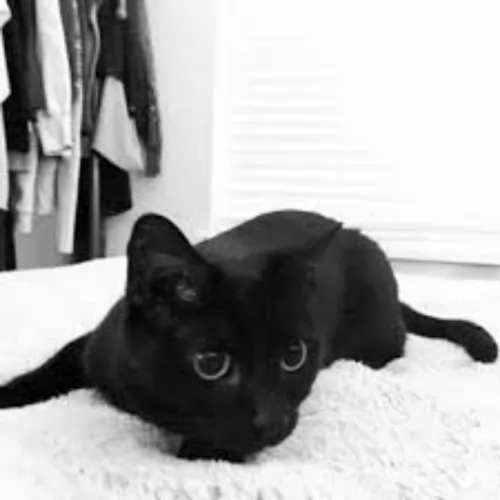 Hybrids suffer from genetic defects. These defects can often require surgery. A cat such as the Pantherette also requires a top-notch diet. You may even have to speak to your vet because these cats often battle to digest their food.
Hybrids suffer from genetic defects. These defects can often require surgery. A cat such as the Pantherette also requires a top-notch diet. You may even have to speak to your vet because these cats often battle to digest their food.
People who work with these hybrid cats say that a problem they often see is inflammatory bowel disease and diarrhea. Remember that cats like these are carnivores and their diets have to be made up essentially of meat if they are to remain healthy.
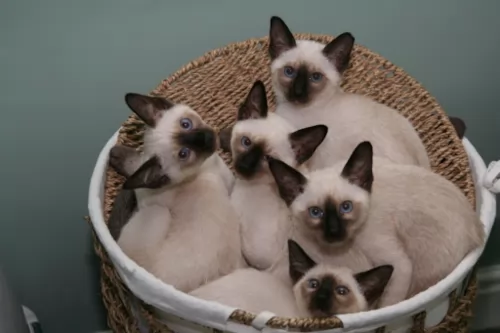 Avoid obesity. Siamese cats are prone to obesity and these slim cats can’t afford weight gain. Extra weight can put a whole lot of pressure on the cat’s joints and they can also develop other problems such as diabetes. The label of the commercial cat food you give your Traditional Siamese will indicate how much food your cat should get a day based on your cat’s weight.
Avoid obesity. Siamese cats are prone to obesity and these slim cats can’t afford weight gain. Extra weight can put a whole lot of pressure on the cat’s joints and they can also develop other problems such as diabetes. The label of the commercial cat food you give your Traditional Siamese will indicate how much food your cat should get a day based on your cat’s weight.
Diet plays a massive role in the health of a cat, and inferior cat foods can mean you spending more money at the vet because of digestive issues.
If you are in any kind of doubt as to what to feed your cat, rather speak to your vet about what and how much to feed him. Your cat is a carnivore and it is most important to feed your cat foods high in protein.
Take your cat to the vet whenever he is sick and also just for a general check-up. You want to make sure that your Traditional Siamese is free from any health problems as well as parasites.
Also, make sure your cat is always up to date with his vaccinations as there are some cat illnesses such as feline panleukopenia, also known as distemper, that can kill your cat.
It is always a good idea as well to spay or neuter your Siamese to prevent unwanted pregnancies.
If your Traditional Siamese has any health conditions, your vet can help provide you and your pet with a treatment program.
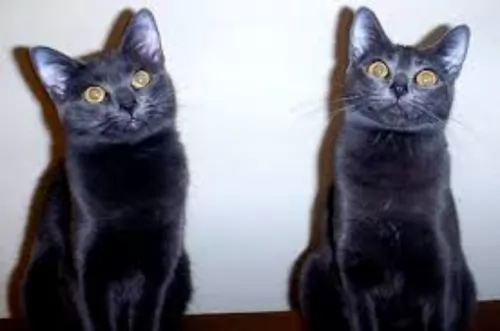 To ensure a quality lifestyle for your Panetherett, you want to care for him properly. A well cared for cat is one that becomes the best pet.
To ensure a quality lifestyle for your Panetherett, you want to care for him properly. A well cared for cat is one that becomes the best pet.
He will have to go to the vet at some stage for sickness and for his vaccines.
Make sure you invest in a cat carrier or sturdy leash as your cat won’t like going to the vet. These cats can struggle, wriggle and writhe and he will make every effort to get away.
Speak to your vet about ticks, fleas, and worms in your pet as these parasites can cause havoc with your cat’s health.
Domestic hybrids such as the Pantherette will need to have a litter box that is cleaned every day. These cats like a clean litter box. Make sure that you scoop the litter box at least one time each day. If you don't clean his litter box regularly, you’ll find that he tends to use other areas of your home as a toilet. Being a hybrid, it is quite likely that he will in any case as these cat's wild side see to this.
Ensure he gets the best cat food there is. A cat is a carnivore which means he is a meat eater. If you buy commercially manufactured pet food, make sure that the top ingredients on the label have meat and protein listed at the top.
Speak to your vet about the absolute importance of quality cat food for your feline pet, as poor quality food can make your cat sick and you’ll be spending more time at the vet.
Cats can easily become dehydrated, so ensure that he has a bowl of fresh, cool water available to him around the clock. You can have one or two water bowls available to him and the water bowls must be cleaned regularly.
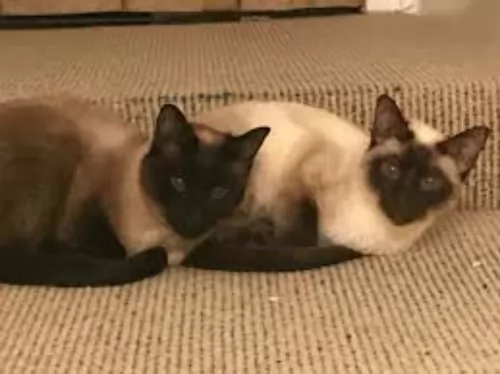 To care for your Traditional Siamese, you need to feed him a high protein diet. Always read the labels of the cat food you buy to ensure that the proteins included come from animal sources and not from plants.
To care for your Traditional Siamese, you need to feed him a high protein diet. Always read the labels of the cat food you buy to ensure that the proteins included come from animal sources and not from plants.
Brush your Traditional Siamese cat regularly. He has a short coat so once a week will be enough to keep it shiny and clean.
You can feed your cat and provide all he needs, but nothing will be more important to your cat than showing your love for him by spending lots of time with him and showering him with love.